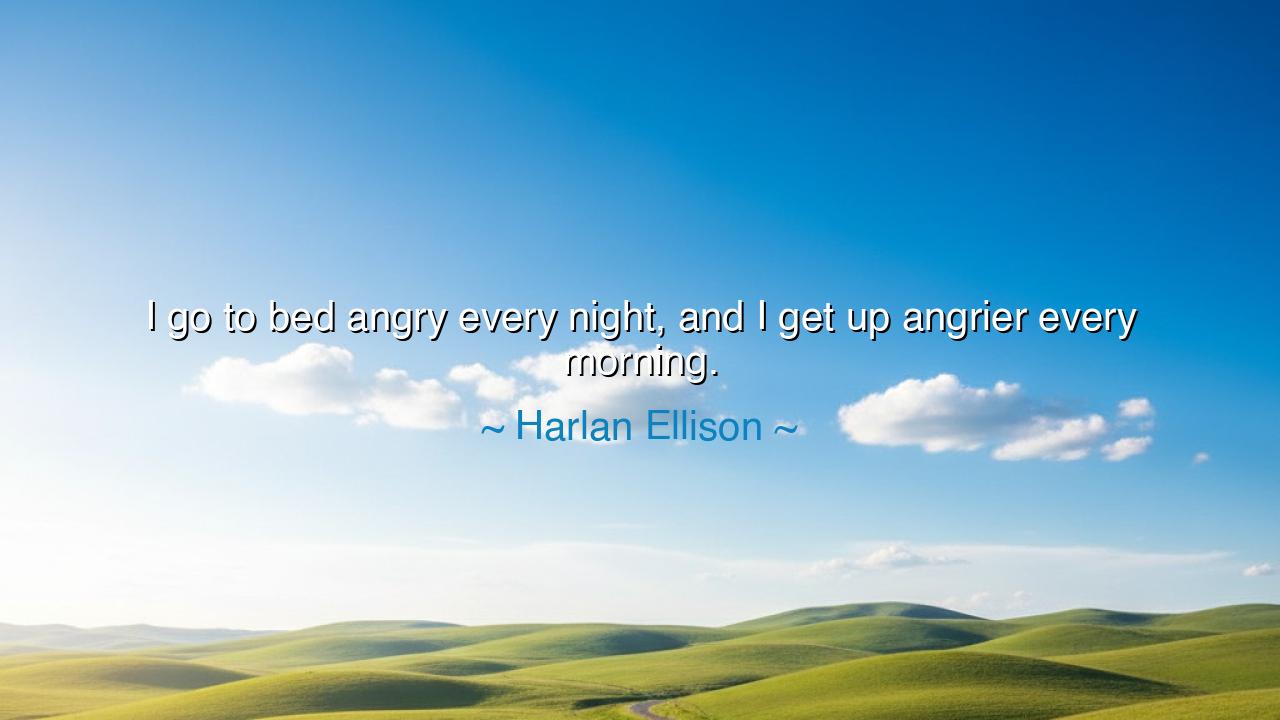
I go to bed angry every night, and I get up angrier every






Harlan Ellison once declared: “I go to bed angry every night, and I get up angrier every morning.” These words are not the bitter grumblings of a man consumed by spite, but the testament of an artist who allowed rage to be the furnace of his creativity. In his confession lies a great paradox: that anger, often condemned as destructive, can also be the force that drives vision, courage, and creation. Ellison teaches us that fury, when harnessed, can be turned into a weapon sharper than any sword.
For what is anger but the soul’s cry against injustice, stupidity, and mediocrity? Many go to bed numb, dulled by the weight of the world. But Ellison chose to burn. He refused to let the failures of society or the cowardice of men pass unchallenged. His sleepless nights and restless mornings were not signs of despair, but of refusal—refusal to accept the world as it is, when it could be made better. This is why he slept in anger and awoke with greater fury: because the struggle was unending, and he was unwilling to grow silent.
The ancients too knew this power. Think of the prophet Jeremiah, who cried that the word of God was like “fire shut up in his bones,” and he could not hold it in. Or consider the Greek hero Achilles, whose anger at the dishonor he suffered drove him to feats that shaped the fate of nations. Though dangerous, this kind of fire is also transformative—it compels action, it refuses complacency, it shatters the chains of resignation. Without anger, no tyrant would fall, no injustice would be challenged, no stagnant order would ever be broken.
Yet Ellison’s words also remind us of the burden such fire brings. To carry anger constantly is to carry a weight that few can endure without scars. Great reformers, rebels, and creators often lived this truth. Martin Luther King Jr., though preaching love, admitted to deep and abiding anger at the injustices he witnessed daily. His greatness was that he did not let it consume him, but transmuted it into vision, action, and sacrifice. This is the alchemy of the spirit: not to extinguish the flame, but to bend it into light.
The meaning of Ellison’s words, then, is this: anger can be a companion to purpose. It keeps the heart awake when others slumber. It stirs the soul when others settle. But it must not be allowed to rage blindly; it must be given direction, like the channeled river that powers the mill instead of flooding the village. Ellison himself, through his fierce writing and uncompromising voice, showed how fury can be turned into art, into truth spoken without compromise, into the courage to confront hypocrisy wherever it lurked.
For those who would learn from this wisdom, the lesson is clear: do not fear your anger. Ask instead what it points to. If you lie awake in fury, ask: what is it in the world that must be changed? If you rise in greater rage, ask: how will I turn this energy into action? Do not let it rot inside you, for then it will devour you. Instead, make it the fire that heats your forge, the storm that drives your ship, the cry that awakens your people.
Thus, Ellison’s seemingly bitter words become a call to arms. To go to bed angry and wake angrier is not a curse, but a vow. It is to declare war against mediocrity, injustice, and silence. It is to live with fire in the bones, unwilling to be lulled by comfort or seduced by apathy. And though such a path is not easy, it is noble—for the world is changed not by those who sleep peacefully, but by those who rise, burning, to strike against the darkness of their age.






AAdministratorAdministrator
Welcome, honored guests. Please leave a comment, we will respond soon